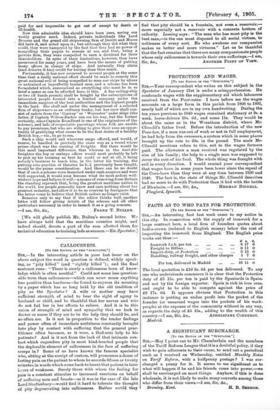[To THE EDITOR 01 THE "SPECTATOR. "] SIR,—Your correspondent who writes
on this subject in the Spectator of January 21st is under a misapprehension. He confounds wages with the supplementary aid which labourers received from the Poor-rates. I have before me the wages accounts on a large farm in this parish from 1808 to 1892, nearly half of which are in my own handwriting. During the ten years previous to 1840 wages remained stationary at 9s. a week, horse-drivers 10s. 6d., and some 11s. They would be about the same as in the Wrentham district, where Mr- Clissold's father lived. Before the introduction of the new Poor-law, if a man was out of work or not in full employment, he had help from the overseers, a system which in some places brought up the rate to 20s. in the pound. The scale Mr- Clissold mentions refers to this, not to the wages farmers paid. The allowance a man received was regulated by the size of his family ; the help to a single man was supposed to Cover the cost of his food. The whole thing was fraught with evil in every direction. I would remind your correspondent that wages have in some years been lower since the repeal of the Corn-laws than they were at any time between 1830 and 1840. The fact is, the state of things Mr. Clissold describes had no more to do with Protection than it had with the battle
of Blenheim.—I am, Sir, &c., HERMAN BIDDELL. Playfard, Ipswich.










































 Previous page
Previous page